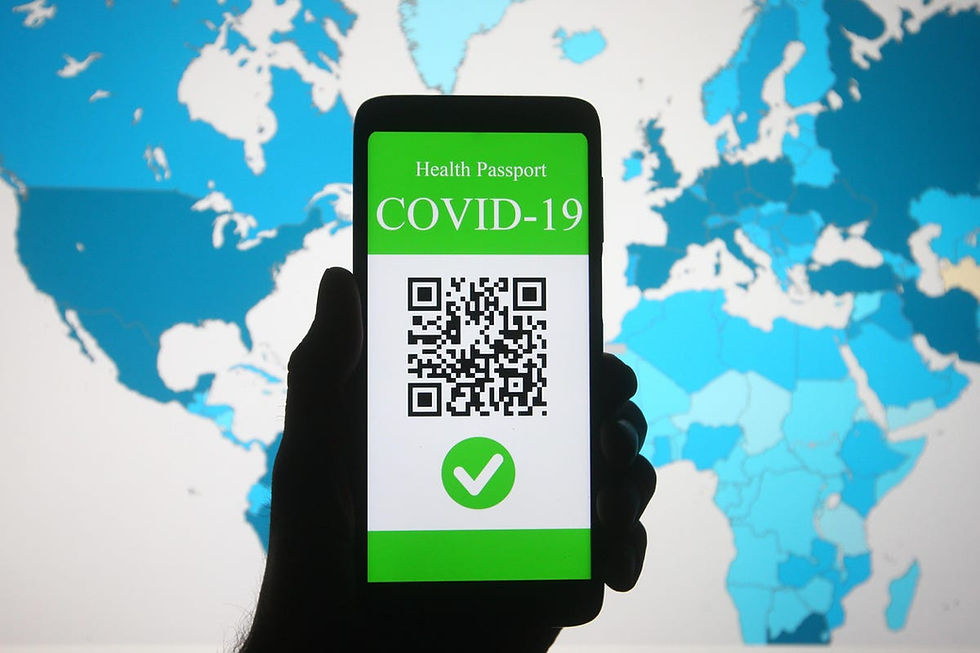WHO Issues Guidance On Digital COVID Certificates Called ‘Conspiracy Theory’ By Media
- truth81
- Aug 31, 2021
- 2 min read
August 31, 2021 | WAHAGEN KHABAYAN
A newly published World Health Organization (WHO) report urges the transition to digital certification of vaccine status, presenting implementation strategies for member states.

The report is labeled as “interim guidance” which should serve countries help in their fight against COVID-19 and “to capture vaccination status to protect against other diseases”.
The central premise appears to be the implementation of Digital Documentation of COVID-19 Certificates (DDCC) which will act as an agent to present and review vaccination status, history of SARS CoV-2 infection and test results. The report acts as a technical guidance, in regard to infrastructure, digital verification processes, and “ethical standards”.
The executive summary states:
In the context of the coronavirus disease (COVID-19) pandemic, the concept of Digital Documentation of COVID-19 Certificates (DDCC) is proposed as a mechanism by which a person’s COVID-19-related health data can be digitally documented via an electronic certificate A digital vaccination certificate that documents a person’s current vaccination status to protect against COVID-19 can then be used for continuity of care or as proof of vaccination for purposes other than health care. The resulting artefact of this approach is referred to as the Digital Documentation of COVID-19 Certificates: Vaccination Status (DDCC:VS).
The main uses of DDCC – as reflected in the report – are:
Continuity of care – record of vaccination – to inform individuals and health care workers when and what type of vaccine should a person receive (in the future).
Proof of Vaccination – vaccination status for purposes not related to health care, such as University education, travel, survey participation.
The report also describes how vaccination should lead to different steps of verification and database administration, after the person receives the vaccination. The certification would transition through security verification steps until a digital certification is generated. Despite the detailed description of various verification steps, the report never signifies the reason why digital verification is needed and why nation states should follow the process to implement a whole new infrastructure. The only stated downside of paper-based verification is potential fraud.
Proof of Vaccination.
Furthermore, the report signifies scenarios where people have “to prove their COVID-19 vaccination status (such as care site, a school, or an airport).”, despite this policy being implemented in only a few places such as New York, France, and Italy.
Data sets & Structures.
The report states that bare minimum information should be included in the identification process. However, the WHO also lists mandatory, new data points that need to be linked to the vaccination status:
Name;
Date of Birth;
Unique Identifier (National ID, Health ID etc.);
Sex;
Vaccine type;
brand;
manufacturer;
market authorization holder;
batch number;
date of vaccination;
Vaccination valid from;
dose number;
total doses;
country of vaccination;
administering center;
signature of health worker;
health worker ID;
disease targeted (name of the disease that vaccine given to protect again);
Due date of next dose;
certificate issuer;
health certificate ID;
certificate valid from;
certificate valid until;
certificate schema version.
Implementation.
The certification would “help” member states either as short-term solution or long-term. In the case of short-term solution, the report suggests the usage of certification until COVID-19 is no longer considered a public health emergency.
Member states, however, can also keep the system to address other pandemics and “to build digital health infrastructure that can be a foundation for digital vaccination certificates beyond COVID-19…”
The report id funded by the Bill and Melinda Gates Foundation, the Government of Estonia, Fondation Botnar, the State of Kuwait, and the Rockefeller Foundation.
Source: The National Pulse









![🎥 Francis R. Connolly: “From JFK To 911 Everything Is A Rich Man’s Trick” [FULL DOCUMENTARY]](https://static.wixstatic.com/media/d3caba_7a62d6fe51c64c778ceb96b3aad45ca9~mv2.png/v1/fill/w_960,h_580,al_c,q_90,enc_avif,quality_auto/d3caba_7a62d6fe51c64c778ceb96b3aad45ca9~mv2.png)

Comments